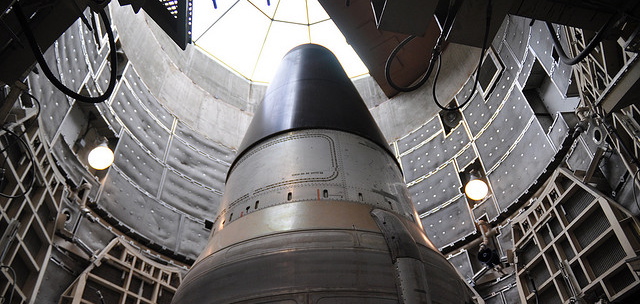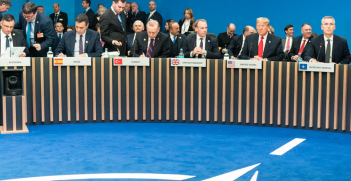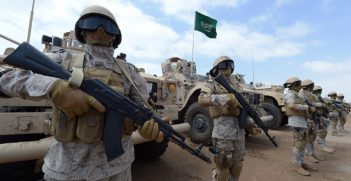Australia Should Lead on a Global No-First-Use Convention

If it believes that nuclear weapons no longer pose a catastrophic threat today, current public opinion is seriously mistaken. As geopolitical tensions are once again on the rise, there are plenty of reasons to work towards a convention enshrining a universal no first use policy (NFP), with Australia being a credible candidate to lead the push for such a convention.
Compared to the great protest marches of the 1980s, global public opinion on the catastrophic dangers posed by the 16,000+ nuclear weapons held by nine countries (China, France, India, Israel, North Korea, Pakistan, Russia, UK and US) is largely apathetic today. Most people seem to think the dangers disappeared into the dustbin of history with the end of the Cold War. The belief is dangerously wrong and we risk sleepwalking into a nuclear disaster. As geopolitical tensions rise once again in three different geographical theatres – East Asia, Middle East and Eastern Europe – their repercussions include risks of reversals on arms control agreements. Thus the US accuses Russia of violating an old nuclear arms control agreement even while a new agreement on reciprocal exchanges by nuclear scientists is mothballed just eleven months after being signed.
Yet the Ukrainian crisis also proves the essential uselessness of nuclear weapons. NATO’s nukes did not deter Russia from annexing Crimea. Nor were they adequate to reassure Eastern European allies against the perceived rising threat from Russia; only additional deployments of conventional troops achieved that result. This is why abolition remains an irreducible goal. But it is also a distant goal. Meanwhile, there are still some low-hanging fruits to be plucked on the nuclear arms control agenda. This article shows why a global convention to enshrine a universal no first use (NFU) policy is one such fruit, and explains why Australia is a credible candidate to lead the push for such a convention.
A First Use Policy is Irrational and Thus Not Credible
The intent to be the first to use nuclear weapons faces an unresolvable paradox. If the adversary is not nuclear-armed, the use of nuclear weapons would exact too heavy a moral and political price for the threat to be credible. This explains why Argentina invaded the Falkland Islands in 1982 despite the British nuclear deterrent; it was confident that the UK would not escalate to the use of nuclear weapons. If the adversary is nuclear-armed and has credible second-strike retaliatory capability, then too a first use posture is not credible as its execution would inflict unacceptable damage on the initiator of nuclear hostilities; a military defeat is always preferable to national annihilation. It would also put the full weight of world moral opprobrium on the side using nuclear weapons first.
The only rational strategy is to threaten but not actually use nuclear weapons first. But if carrying out the threat would be national suicide, then the threat cannot be credible. And a non-credible threat cannot deter. Thus what is important is not a first-use policy, but credible second-strike capability. Once that is attained, a NFU policy, backed by appropriate nuclear force posture and deployment patterns, is a critical step back from nuclear brinksmanship while shifting the onus of nuclear escalation on the adversary.
Furthermore a NFU policy avoids the need for forward deployment, launch-on-warning postures and pre-delegation of authority to battlefield commanders, thereby significantly dampening the prospects of accidental and unauthorized use. A NFU policy also counteracts crisis instability in that it reduces the pressure on decision-makers to ‘use or lose’ their nuclear arsenal. The incentive and temptation to use nuclear weapons pre-emptively are lessened.
It is simplistic therefore to dismiss NFU as merely declaratory, easily ignored in war time. A universal NFU policy by all nine nuclear-armed states would have considerable practical impact with flow-on requirements for nuclear force posture and deployment, for example, de-alerting (taking weapons off high operational alert status: 2,000 nuclear weapons are presently held in hair-trigger launch-on-warning readiness), de-mating (separating warheads from delivery vehicles and storing them apart in disassembled state) and de-targeting (keeping weapons without aiming them at specific targets). In turn this would reduce trust deficits and promote confidence-building while strengthening the norm of non-use of nuclear weapons.
Australian Leadership
Why should Australia take the lead on the issue and not just leave it to the nine nuclear-armed states?
To begin with, under the NPT nuclear disarmament is a shared security responsibility of all countries party to the treaty, not just the prerogative of the nuclear powers to be done at their whim and pleasure. Anything which reduces the risks of a nuclear exchange is in the security interests of all countries.
Australia also has a proud tradition of global leadership on niche arms control issues. Most recently Canberra led the efforts to secure the Arms Trade Treaty and a UN Security Council resolution on light arms and small weapons. Gareth Evans played a key role in the negotiation of the Chemical Weapons Convention, followed by Alexander Downer’s critical role in shepherding the Comprehensive Test Ban Treaty (CTBT) through the UN General Assembly when it was stalemated in Geneva (Yes Virginia, we can make good use of the multilateral UN when we are not busy scapegoating it for our failures of bilateral diplomacy).
Asia is the only continent where numbers of nuclear weapons are actually still rising (in China, India, North Korea and Pakistan), so leadership from within Asia makes sense. A nuclear exchange between India and Pakistan is also considered to be among the most plausible by the specialist community. Australia is among a handful of Asia-Pacific countries with the entire supporting infrastructure – quality of political and bureaucratic leadership, scientific and technical expertise, credibility in all the relevant constituencies, and financial and human resources – to be able to consider launching a sustained initiative on this.
At the same time, China and India are officially committed to a NFU policy and thus there are no adverse implications for Australia’s bilateral relations with these key countries. And there are good reasons to believe that Washington too wants to move in this direction but has been held back by the nervousness of some of its allies in Asia and Europe.
All of which puts the reach of low-hanging fruit of a NFU convention within Australia’s normative grasp.
Ramesh Thakur is Director and Professor, Centre for Nuclear Non-Proliferation and Disarmament, Australian National University. He co-edited, with Gareth Evans, Nuclear Weapons: The State of Play (CNND, 2013), with Maria Rost Rublee the four-voulme Nuclear Politics (Sage, 2014), and is the author of Nuclear Weapons and International Security (Routledge, forthcoming 2015).





